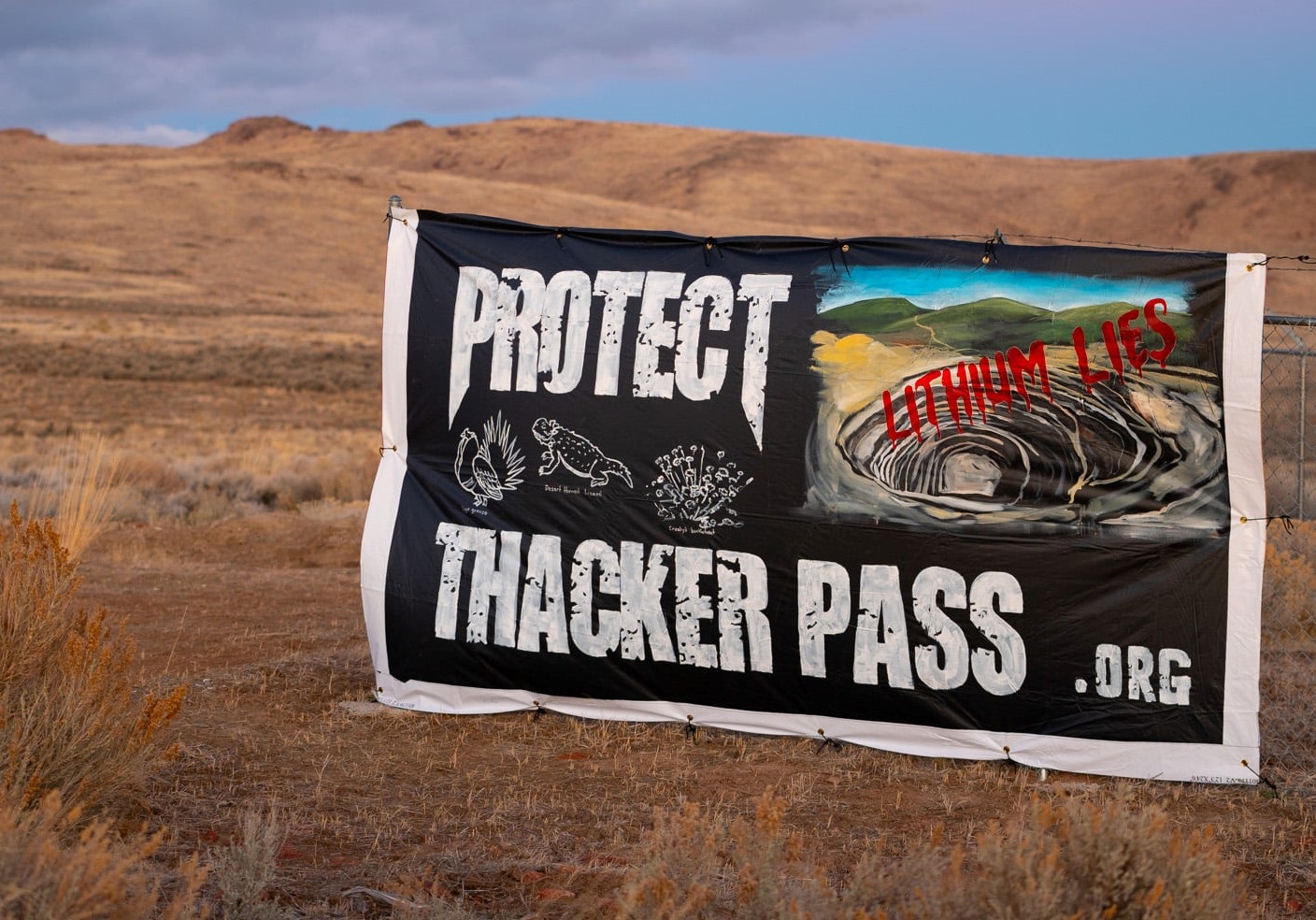
- Details
- By Darren Thompson
RENO, Nev. — Today, General Motors (GM) Co. announced that it will invest $650 million in Lithium Americas Corporation, the company that is developing a lithium mine on Thacker Pass in northern Nevada. If completed, the mine will be the largest lithium mine in the United States.
GM’s investment is conditional on whether the Thacker Pass project clears the final environmental and legal challenges it’s currently facing in a federal court in Reno where conservation organizations and Tribes have filed suit to stop the project.
GM said in a statement that its investment represents the largest-ever investment by an automaker to produce raw materials for lithium batteries.
“GM has secured all the battery material we need to build more than 1 million EVs annually in North America in 2025 and our future production will increasingly draw from domestic resources like the site in Nevada we’re developing with Lithium Americas,” GM Chair and CEO Mary Barra said in a statement. “Direct sourcing critical EV raw materials and components from suppliers in North America and free-trade-agreement countries helps make our supply chain more secure, helps us manage cell costs, and creates jobs.”
However, Native News Online reported in February 2022 that Tesla made an agreement worth $1.5 billion to purchase 75 tonnes of raw nickel over the next six years in northern Minnesota. Nickel is a key metal used to extend the range of lithium batteries, and demand for nickel is expected to increase over the next decade as the automobile industry supplies more electric vehicles.
Approvals for the mine’s permit were fast-tracked in the last days of the Trump Administration by the Bureau of Land Management (BLM). Tribes, including the Reno-Sparks Indian Colony (RSIC) and Burns Paiute Tribe (Oregon), conservation groups, and a rancher want to see the area preserved due to its significance to 22 tribes in the area.
Thacker Pass is called Peehee Mu’huh, or Rotten Moon, in Paiute because, in 1865, federal cavalry killed men, women and children and then left their bodies to rot.
The RSIC and Burns Paiute Tribe said that, “The proximity of the Indian Lodgings in the project area, combined with the intervening plaintiffs’ oral histories describing how Paiute people, being hunted by the US Cavalry, hid in Thacker Pass, and especially the new accounts of the massacre make it very likely that the Sept. 12, 1865 massacre happened, at least partially, within the project area.”
To the Tribes, the land is sacred, just like the Oglala Lakota deem the site of Wounded Knee sacred, where nearly 300 men, women, and children were killed while unarmed in December 1890.
Tribes also argued that the BLM did not consult with them on the project. BLM recently fined Protect Thacker Pass — a grassroots collective working to stop the mine project — $49,890 for putting up latrines for Native elders as they visited the camp that acted as a watchdog on the proposed open lithium mine.
In oral arguments on Jan. 5 in Reno, lawyers for Lithium Americas and the BLM insisted the Thacker Pass project complies with U.S. laws and regulations. BLM attorneys argued that the project followed procedures used in the past to determine what projects necessitate government-to-government consultation and outreach. They also added that Tribes had not alerted the BLM to the sacredness of the land in past projects. In their arguments, attorneys for BLM argue that supporting the transition to “green energy” is a key part of President Joe Biden’s push to reduce greenhouse gas emissions.
U.S. District Judge Miranda Du said that she will make a decision on the Thacker Pass project in the next couple of months. Du has refused twice in the past year to grant temporary injunctions sought by tribal leaders.
A spokesperson for the Reno-Sparks Indian Colony was unavailable for comment as of press time.
More Stories Like This
Gwich'in Tribal Governments Submit Comments Challenging Fish and Wildlife Service's Inadequate Environmental Review of Arctic Refuge Snow RoadRappahannock Tribe Challenges 9M-Gallon Water Plan
Feds release draft long-term plans for Colorado River management
Apache Leader Walks 60 Miles to Court Hearing That Will Decide Fate of Sacred Oak Flat
Rappahannock Tribe Raises Sovereignty and Environmental Concerns Over Caroline County Water Permit
Help us defend tribal sovereignty.
At Native News Online, our mission is rooted in telling the stories that strengthen sovereignty and uplift Indigenous voices — not just at year’s end, but every single day.
Because of your generosity last year, we were able to keep our reporters on the ground in tribal communities, at national gatherings and in the halls of Congress — covering the issues that matter most to Indian Country: sovereignty, culture, education, health and economic opportunity.
That support sustained us through a tough year in 2025. Now, as we look to the year ahead, we need your help right now to ensure warrior journalism remains strong — reporting that defends tribal sovereignty, amplifies Native truth, and holds power accountable.
 The stakes couldn't be higher. Your support keeps Native voices heard, Native stories told and Native sovereignty defended.
The stakes couldn't be higher. Your support keeps Native voices heard, Native stories told and Native sovereignty defended.
Stand with Warrior Journalism today.
Levi Rickert (Potawatomi), Editor & Publisher

